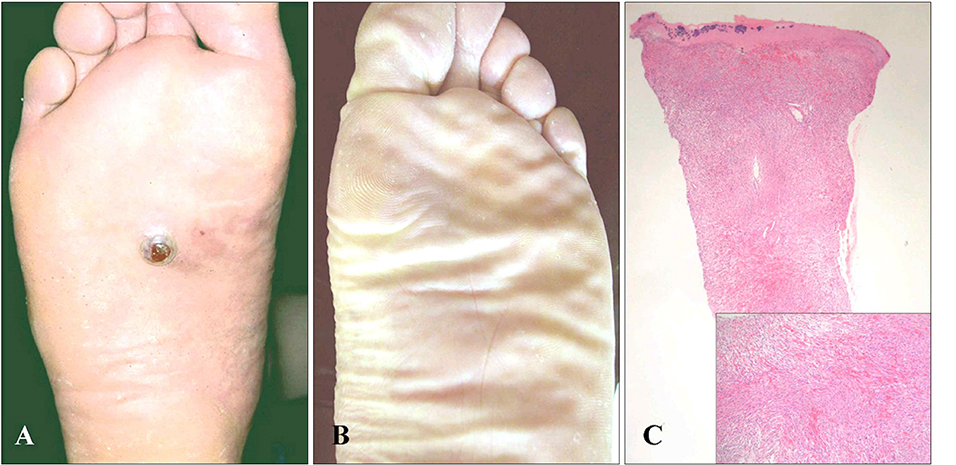Ann Dermatol.
2008 Sep;20(3):162-165. 10.5021/ad.2008.20.3.162.
Recurrent Classical Type of Kaposi's Sarcoma Treated by Interferon-alpha
- Affiliations
-
- 1Department of Dermatology, Kangnam St. Mary's Hospital, College of Medicine, The Catholic University of Korea, Seoul, Korea. knderma@catholic.ac.kr
- KMID: 2156386
- DOI: http://doi.org/10.5021/ad.2008.20.3.162
Abstract
- Kaposi's sarcoma (KS) is a lympho-angioproliferative disease, with four variants; one of which is classical KS (CKS). Classical KS is clinically characterized by single or multiple pea-sized bluish-red macules on the distal portions of the lower extremities. A 60-year-old man presented with an asymptomatic, solitary patch on the left sole. He had been successfully treated for the classical type of Kaposi sarcoma on the right sole with interferon-alpha 3 years before. The patient was treated with six million units of interferon-alpha three times per week for 6 months. The lesion showed complete resolution and there has been no report of recurrence for 1 year after treatment.
Keyword
MeSH Terms
Figure
Cited by 1 articles
-
Treatment of Disseminated Classic Type of Kaposi's Sarcoma with Paclitaxel
Soo Yeon Kim, Dae Hoon Kim, Hyo Jin Lee, Young Joon Seo, Jeung Hoon Lee, Young Lee
Ann Dermatol. 2011;23(4):504-507. doi: 10.5021/ad.2011.23.4.504.
Reference
-
1. Aldenhoven M, Barlo NP, Sanders CJ. Therapeutic strategies for epidemic Kaposi's sarcoma. Int J STD AIDS. 2006; 17:571–508.
Article2. Costa da Cunha CS, Lebbe C, Rybojad M, Agbalika F, Ferchal F, Rabian C, et al. Long-term follow-up of non-HIV Kaposi's sarcoma treated with low-dose recombinant interferon α-2b. Arch Dermatol. 1996; 132:285–290.
Article3. Caccialanza M, Marca S, Piccinno R, Eulisse G. Radiotherapy of classic and human immunodeficiency virus-related Kaposi's sarcoma: results in 1482 lesions. J Eur Acad Dermatol Venereol. 2008; 22:297–302.
Article4. Luppi M, Barozzi P, Rasini V, Riva G, Re A, Rossi G, et al. Severe pancytopenia and hemophagocytosis after HHV-8 primary infection in a renal transplant patient successfully treated with foscarnet. Transplantation. 2002; 74:131–132.
Article5. Corbellino M, Bestetti G, Scalamonga C, Calattini S, Galazzi M, Meroni L, et al. Long-term remission of Kaposi sarcoma-associated herpesvirus-related multicentric Castleman disease with anti-CD20 monoclonal antibody therapy. Blood. 2001; 98:3473–3475.
Article6. Gheith O, Bakr A, Wafa E, Fouda A, El Agroudy A, Refaie A, et al. Sirolimus for visceral and cutaneous Kaposi's sarcoma in a renal transplant recipient. Clin Exp Nephrol. 2007; 11:251–254.
Article7. Krown SE, Li P, Von Roenn JH, Paredes J, Huang J, Testa MA. Efficacy of low-dose interferon with antiretroviral therapy in Kaposi's sarcoma: a randomized phase II AIDS clinical trials group study. J Interferon Cytokine Res. 2002; 22:295–303.
Article8. Tardivo JP, Del Giglio A, Paschoal LH, Baptista MS. New photodynamic therapy protocol to treat AIDS-related Kaposi's sarcoma. Photomed Laser Surg. 2006; 24:528–531.
Article9. Cianfrocca M, Roenn JH. Epidemic Kaposi's sarcoma. Oncology. 1998; (12):1375–1381.
- Full Text Links
- Actions
-
Cited
- CITED
-
- Close
- Share
- Similar articles
-
- A Case of Classic Kaposi's Sarcoma Treated with Interferon-alpha
- Therapeutic Thai of Recombinant Human Interferon-αA for a Case of Kaposi's Sarcoma
- A Case of Conventional Kaposi' s Sarcoma
- A case of gastrointestinal Kaposi sarcoma in a patient with AIDS
- A Case of Gastrointestinal and Cervical Lymph Nodal Kaposi's Sarcoma in a Patient with Acquired Immunodeficiency Syndrome



